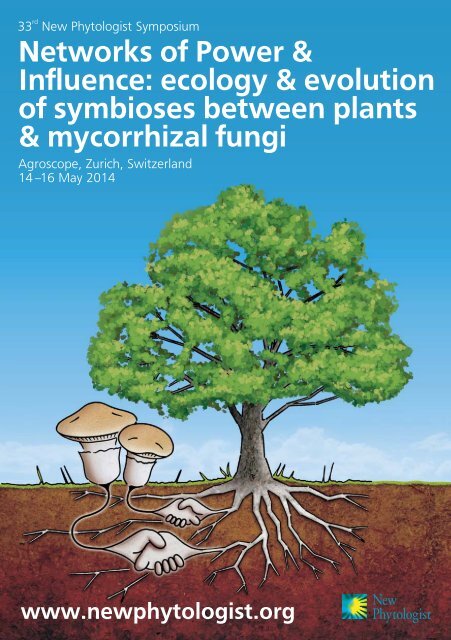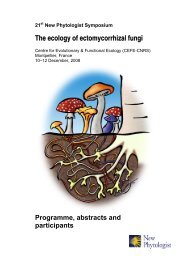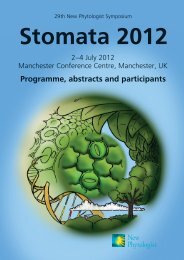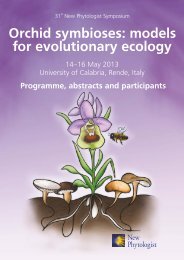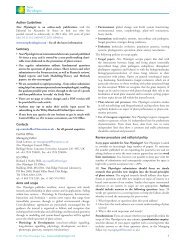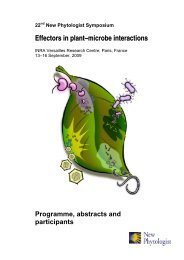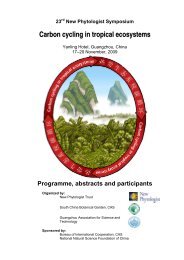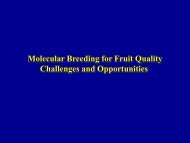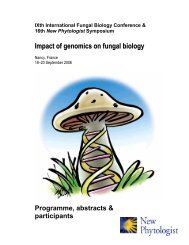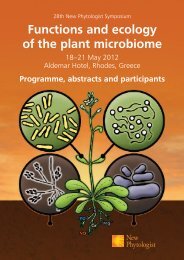33rd NPS Flyer (pdf) - New Phytologist Trust
33rd NPS Flyer (pdf) - New Phytologist Trust
33rd NPS Flyer (pdf) - New Phytologist Trust
You also want an ePaper? Increase the reach of your titles
YUMPU automatically turns print PDFs into web optimized ePapers that Google loves.
d<br />
33 <strong>New</strong> <strong>Phytologist</strong> Symposium<br />
Networks of Power &<br />
Influence: ecology & evolution<br />
of symbioses between plants<br />
& mycorrhizal fungi<br />
Agroscope, Zurich, Switzerland<br />
14–16 May 2014<br />
www.newphytologist.org
d<br />
33 <strong>New</strong> <strong>Phytologist</strong> Symposium<br />
Networks of Power &<br />
Influence: ecology &<br />
evolution of<br />
symbioses between<br />
plants & mycorrhizal<br />
fungi<br />
Agroscope, Zurich, Switzerland 14–16 May 2014<br />
Scope<br />
Mycorrhizal fungi form symbiotic associations with the<br />
majority of plants and play a key role in almost all<br />
ecosystems. Major gaps in our understanding of the<br />
symbiosis between plants and mycorrhizal fungi have been<br />
addressed in recent years, but at the same time there are still<br />
several pressing questions to be resolved. These include: (1)<br />
Which traits can be used to characterize functional diversity<br />
in mycorrhizas and is it possible to link functional diversity to<br />
ecosystem functioning (2) How are mycorrhizal networks<br />
organized, how do they function and how do plants interact<br />
with multiple partners and symbionts (3) How are fluxes of<br />
carbon and nutrients between partners regulated and how<br />
are signals exchanged (4) What is the role of mycorrhizas in<br />
soil food webs and what controls the dynamics of<br />
mycorrhizal fungal populations in space and time (5) What<br />
is the mycorrhizal contribution to the sustainability of<br />
ecosystems and can mycorrhizal fungi be used for<br />
sustainable plant production <strong>New</strong> tools and concepts are<br />
required to answer these questions.<br />
In this symposium, we will bring together a wide range of<br />
scientists from different disciplines working on mycorrhizal<br />
fungi and plant–microbe interactions. We aim to provide an<br />
overview of the advances in mycorrhizal ecology in the last<br />
decade. In addition to this, specific talks will highlight new<br />
research areas and address the big questions for future<br />
research.<br />
Symposium format<br />
The symposium will take place over three days at the Swiss<br />
Federal Research Institute, Agroscope in Zurich. There will be<br />
dedicated time for focused discussions, posters, selected<br />
poster talks and a conference dinner.<br />
Confirmed speakers and discussion leaders:<br />
Jim Bever Indiana University, USA<br />
Martin Bidartondo Imperial College London, UK<br />
Ian Dickie Landcare Research, Lincoln, <strong>New</strong> Zealand<br />
Alastair Fitter University of York, UK<br />
Marcel van der Heijden Agroscope Reckenholz Tänikon,<br />
Switzerland<br />
Thorunn Helgason University of York, UK<br />
David Hibbett Clark University, USA<br />
Nancy Johnson Northern Arizona University, USA<br />
David Johnson University of Aberdeen, UK<br />
Toby Kiers Vrije Universiteit Amsterdam, Netherlands<br />
John Klironomos University of British Columbia, Canada<br />
Björn Lindahl Swedish University of Agricultural Sciences, Sweden<br />
Francis Martin INRA, Nancy, France<br />
Alicia Montesinos-Navarro Universidad Nacional Autónoma<br />
de México, Mexico<br />
Maarja Öpik Tartu University, Estonia<br />
Maria Pozo Estacion Experimental del Zaidin, CSIC, Spain<br />
David Read University of Sheffield, UK<br />
Matthias Rillig Freie Universität Berlin, Germany<br />
Ian Sanders University of Lausanne, Switzerland<br />
Bernhard Schmid University of Zurich, Switzerland<br />
Marc-André Selosse Muséum national d'Histoire naturelle, France<br />
Sally Smith University of Adelaide, Australia<br />
Andrew Smith University of Adelaide, Australia<br />
Leho Tedersoo Tartu University, Estonia<br />
Anders Tunlid Lund University, Sweden<br />
Wim van der Putten Nederlands Instituut voor Ecologie (NIOO),<br />
Netherlands<br />
Organisation<br />
Prof. Marcel van der Heijden Ecological Farming Systems<br />
Group, Agroscope Reckenholz Tänikon, Zurich<br />
Prof. Francis Martin Laboratory of Excellence ARBRE, INRA,<br />
Nancy<br />
Prof. Ian Sanders Department of Ecology and Evolution,<br />
University of Lausanne<br />
Prof. Marc-André Selosse Muséum national d'Histoire<br />
naturelle, Paris<br />
Contact<br />
<strong>New</strong> <strong>Phytologist</strong> <strong>Trust</strong><br />
Michael Panagopulos<br />
np-symposia@lancaster.ac.uk<br />
<strong>New</strong> <strong>Phytologist</strong> Central Office, Bailrigg House, Lancaster<br />
University, Lancaster, LA1 4YE, UK.<br />
@<strong>New</strong>Phyt<br />
fb.com/<strong>New</strong><strong>Phytologist</strong><br />
The <strong>New</strong> <strong>Phytologist</strong> <strong>Trust</strong> is a non-profit making<br />
organisation dedicated to the promotion of plant science.<br />
Complete details and registration at<br />
www.newphytologist.org<br />
Networks of Power and Influence design and print supplied by APPS, www.promotional-goods.org.uk This leaflet is printed on recycled material.


